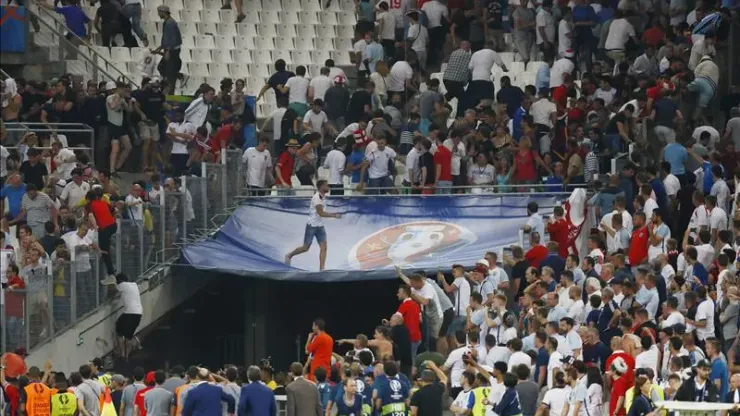Saturday’s Euro 2016 competition was a fantastic day of tournament soccer.
But it wasn’t a fantastic day at a major tournament.
A dark cloud of hooliganism and thuggery, building for several days between English and Russian fans, exploded over the canvas of the championship in Marseille.
Clashes before the game between England and Russia left the Old Port smelling like tear-gas, with one person in critical condition, several injured, several more under arrest, and the city caked in blood and broken glass.
The match itself, at least inside the breathtaking Stade Velodrome, was a glorious reprieve. At full-time, things would only get worse.
Russian ultras, many clad in black, charged a neutral section filled with English fans. A minority engaged in the fighting, but a number of Brits were left to flee the stands fearing for their safety. It was a sickening and upsetting scene, one that left Joe Hart pleading from the field with fans to “stay safe.”
Certainly, the violence in Marseille was a two-way street. England supporters, who disgraced themselves in this very city at the World Cup in 1998, don’t come away blameless.
And it certainly wasn’t all Russian fans. But there’s no denying that a number of ultras wanted to turn Marseille, and then Marseille’s stadium, into a war zone.
With Russia, this kind of organized terror for terror’s sake isn’t new or particularly surprising.
At Euro 2012, Russian and Polish fans clashed in the streets of Warsaw before Russian fans unveiled a banner before the match between the two sides that referenced the Soviet Union’s invasion of Poland in World War II.
Just days before, a group of Russian fans attacked stewards at the stadium in Wroclaw during a game against the Czech Republic – sending four to the hospital.
Stewards were again the targets of Russian hooliganism on Saturday night. The flare set off in the Russian end at the end of the game was, according to The Sun’s Charlie Wyett, a signal to overwhelm the security in their section and advance on the England fans.
Another mark of Russia’s last campaign at the European Championships – one that ended with the team crashing out in shocking fashion against Greece – was racism. In their team’s first game, Russian fans directed racist chants at Czech full back Gebre Salassie.
SEE MORE: UEFA threaten Russia and England with Euro exit if more violence
Later that year, fans of one of Russia’s leading clubs, Zenit St. Petersburg, declared that they’d tolerate no non-white or gay players on their team. Last year, Zenit’s star player Hulk – who has truly lived up to his superhero name for the club – said that he is the target racism in Russia “almost every game.”
Russia, of course, is in line to host the World Cup in two years. And even forgetting for a moment the allegations of bribery in the bidding for that tournament, or the myriad of human rights violations allegedly committed by the regime of authoritarian leader Vladimir Putin, that is a travesty.
Yaya Toure warned three years ago of the possibility of a boycott by players of African descent, but that possibility isn’t good enough.
No player should have to be put in the position of potentially risking his safety, and certainly his dignity, to represent his country at the World Cup. Fans shouldn’t be asked to risk their safety to attend matches.
And we haven’t even started to address the position that gay and lesbian players and fans would be forced into by traveling to a country notorious for its barbarous treatment of its gay and lesbian people.
SEE MORE: Schedule of Euro 2016 games on US TV and streaming
International tournaments are supposed to be celebrations, both of the sport of soccer, and the sport’s power to unite people. Dimitri Payet’s goal in France’s win on Friday against Romania illustrated that point quite clearly.
And we should be talking right now about the games. Albania’s near miss, Wales’ joy, England’s promise, Gareth Bale’s free-kick, or Eric Dier’s, or Wayne Rooney’s fantastic midfield display, or, absolutely, the towering header from Russian captain Vasili Berezutski to rescue a point for his nation.
That Berezutski goal should have been celebrated. It shouldn’t have merely served as an appetizer for more violence.
Both England and Russia’s traveling contingent of supporters will be watched closely as this tournament progresses. But we’ve already seen enough. Holding the next World Cup in Russia would be an insult to the promise – however idealistic – of international soccer.
And if that doesn’t convince you, the eerie scene on the ground in Marseille right now should. Russia is unfit to host the World Cup.
200+ Channels With Sports & News
- Starting price: $33/mo. for fubo Latino Package
- Watch Premier League, Women’s World Cup, Euro 2024 & Gold Cup
The New Home of MLS
- Price: $14.99/mo. for MLS Season Pass
- Watch every MLS game including playoffs & Leagues Cup
Many Sports & ESPN Originals
- Price: $10.99/mo. (or get ESPN+, Hulu & Disney+ for $14.99/mo.)
- Features Bundesliga, LaLiga, Championship, & FA Cup
2,000+ soccer games per year
- Price: $5.99/mo
- Features Champions League, Serie A, Europa League & Brasileirāo
175 Premier League Games & PL TV
- Starting price: $5.99/mo. for Peacock Premium
- Watch 175 exclusive EPL games per season






